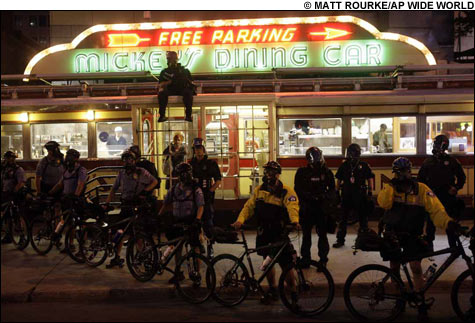Although the St. Paul police would seem to have been the force behind such pointless acts of aggression, according to the Minnesota Independent, 3000 of the 3700 officers on duty were pulled in from outside of the city — or state. (I came across patrolmen from Senator John McCain’s home state of Arizona with the greatest frequency.) And, as recent political conventions have been dubbed “National Special Security Events” by the Department of Homeland Security (DHS), safekeeping generally falls, in fact, to the FBI’s Joint Terrorism Task Force — a coalition that includes the FBI, the DHS, the Transportation Security Administration, the Coast Guard, the Secret Service, and Immigration and Customs Enforcement (ICE).
With backing of and funding from such agencies, the St. Paul police purchased gear and high-tech weaponry to ease the perpetration of violence, and developed a plan to absolve perpetrators from legal penalty. Without the massive display of force, Bob Fletcher — sheriff of Ramsey County, which includes St. Paul and Minneapolis — explained, “this town would have been destroyed.”
Of course, the goal was to silence those assembling and speaking against the platforms of one party in a two-party electoral system, against which dissent is constitutionally — and simply logically — guaranteed. These facts continue to appall the few who’ve heard them. Yet that most Americans aren’t even aware these police-state tactics were enacted was both a central part of the RNC crackdown strategy and represents a clear continuation of Bush administration policy.

READY FOR BATTLE: Law-enforcement officials from as far away as Arizona converged on St. Paul for the Republican National Convention this past month. With them they brought tear gas, Tasers, and riot gear, as well as a police-state attitude that led to approximately 800 arrests and several violent clashes with protesters. |
An overwhelming show of force
Those crackdowns started early. Information-gathering and surveillance of RNC and Democratic National Convention protesters had been in full force for close to a year. A story in the Twin Cities alt-weekly City Pages revealed a plan to hire informants to infiltrate “vegan potlucks” in the state capital metropolitan area back in May. Arrests and raids commenced several days before the conventions were planned to start, primarily moving on independent media organizations known for documenting civil-rights abuses.
One took place the Friday before the convention started, when members of the Ramsey County Sheriff’s Department and the St. Paul police violently forced their way into the convergence center of the RNC Welcoming Committee (a self-described “anarchist/anti-authoritarian organizing body preparing for the 2008 Republican National Convention in St. Paul”), threw more than 50 activists of all ages — from the pee-in-their-pants-young to the health-issue old — to the floor, handcuffed them, and detained them for two hours. They had been eating dinner and watching a movie. A teacher in her 60s grew concerned for her health. Officers did not respond to her requests for aid. The mother of a five year old later explained to reporters that she was told the cuffs were necessary “for our safety and for theirs.”
A 15 year old from Madison, Wisconsin, named Rebekah [we are withholding her last because she is a minor] had been coloring when a gun was shoved into her face and she was forced onto the ground. She spent two and a half hours there before officers noticed and released her — clearly having forgotten about her and her status as a minor. (As such, it is not legal for them to have released her except into the custody of her parents.)
Warrants were not displayed, computer equipment was improperly confiscated, and the group was ultimately charged with a fire-code violation — a trumped-up charge that, though not the jurisdiction of the Sheriff’s Department, succeeded in keeping the center closed for almost 24 hours. Most detainees were released immediately, but several were held — either detained for the maximum allowable time period (48 hours from the start of the next business day, Tuesday) or charged.
An employee of a SuperAmerica convenience store down the road, Gina [who preferred to withhold her last name], was driving home past the convergence center later that night. She was pulled over and her vehicle was searched, despite the fact that she was clearly not an anarchist. “I was wearing my uniform,” she explains.
She also knew the law. “I told them, ‘I’m graduating from the police academy in two weeks. So, where is your warrant for searching my vehicle? I don’t consent to this.’ ”
“That show of force was so overwhelming, and that’s before we even got to the street,” says Emily Forman, member of the New York–based I-Witness Video collective (which, according to its Web site, “uses groundbreaking techniques to harness the power of video to protect civil liberties and the right to use public space”), referring to the pre-emptive raid police led on the I-Witness Video house the next morning, as well as other police actions that week. I-Witness Video was targeted in daily raids at the RNC because of their success in assisting civil-rights cases at the 2004 RNC. “That’s what was so terrifying to me.”